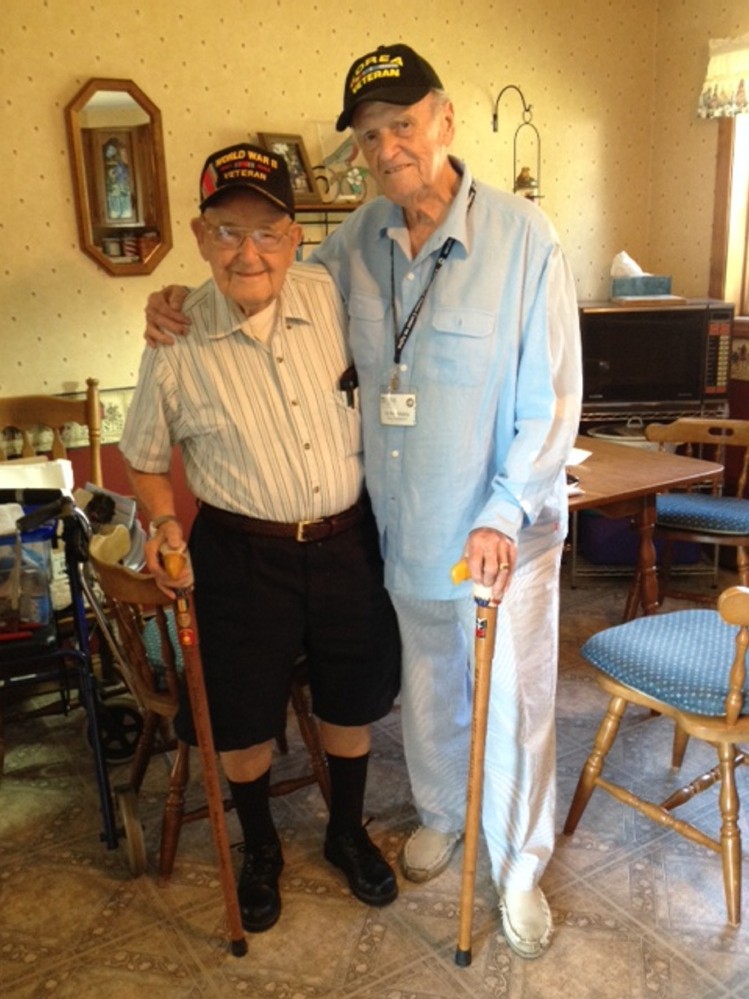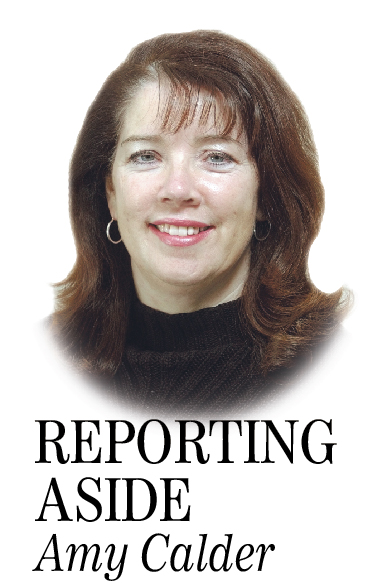Harry Dixon and Ed Morrissey couldn’t be more different, but they get along famously.
Dixon, 93, is a little over 5 feet tall and quiet, although he tells a good story when he gets going. Morrissey is 85 and nearly 6 feet tall, slim and talkative. In fact, he says Dixon tells him he talks too much. Morrissey then laughs heartily.
“We never had a cross word,” he said.
We sit in Dixon’s Skowhegan kitchen where the two men swap war stories Tuesday. Morrissey, of Norridgewock, served in the U.S. Navy during the Korean War and was a second class dental technician. Dixon was a technician, 5th Class, in the U.S. Army in World War II.
Morrissey is a senior companion to Dixon through the University of Maine Center on Aging program. Dixon left his home in Lewiston over a year ago to live with his daughter, Carol Corson, in Skowhegan, and the adjustment was difficult for him.
Corson, who works long hours at Redington-Fairview General Hospital, called the Center on Aging to see if there was someone who could spend time with her father.
“It was one of the best things I did,” she said. “They said, ‘I think I have just the guy for you.'”
As a senior companion, Morrissey has spent the last 11 years being a friend to many elderly people from all walks of life. He enjoys them all, but there’s something special about Dixon.
“We like the Dairy Queen on Kennedy Memorial Drive in Waterville, don’t we, Harry?” he says. “It’s $10 for both of us — hot dog and drink, chips, a soda and a sundae. It’s a good deal.”
Three times a week, they get together, don their veterans’ caps and canes and head out into the world. Sometimes they go to Lake George in Skowhegan or Canaan to hang out. A lot of times they will go out to eat — and they get noticed.
“Sometimes the waitress will just say, ‘The check is all taken care of, even the tip, and the person wants to remain anonymous,'” Morrissey said. “Isn’t that nice?”
One time at Ruby Tuesday in Waterville, Dixon and Morrissey were sitting at a booth and this guy came by with his wife.
“He puts $25 in cash on the table,” Morrissey said. “He says, ‘God bless you guys. Thank you very much for your service.’ Before we could even say thank you, he was out the door.”
They have a great time together. Morrissey has taken Dixon to the Colby College Museum of Art in Waterville, where Morrissey is a docent. They went up to Anson to visit a guy who does stained glass, and Dixon enjoyed it a lot because he does stained glass work himself and his colorful pieces grace the walls of his daughter’s home.
When Dixon was serving in World War II from 1943 to 1945, he was in the Ordnance Repair Unit, fixing everything from watches to tanks.
“We did trucks and Jeeps and artillery and machine guns,” he said.
Dixon landed at Normandy and marched through France into Germany to Berlin. He served in all five battle zones and has five battle stars.
“We went a month without taking a shower, living in the ground in fox holes. We dug them the size of a bathtub so we could sleep in them.”
He remembers going to Hitler’s castle in the Austrian Alps at the end of the war.
“He had everything there — stone buildings. It was big and had quite a few rooms to it. It was right up in the top of the mountains, big tables and chairs and the best of furniture. He had everything at the time, but he lost everything.”
He tells some humorous stories, such as when he first entered the service and told his superiors that he could fix watches. To ascertain whether Dixon was just saying he could repair watches or really could, he got sent to a colonel at base headquarters. The colonel produced a watch whose stem was detached.
“He said, ‘What’s wrong with my watch?'” Dixon recalled. “I told him the technical points, that a detent screw was loosened up and the stem and crown came out. I wanted to tell him he had a screw loose, but I didn’t dare to.”
He and Morrissey laugh, but then Morrissey gets serious.
“We sit back in our comfortable chairs, and when these men were over there, it was a long war and it was cold and the guys would be marching, marching and they had minimal food to eat,” Morrissey said. “When you were in the service, it was very, very harsh.”
He nods to Dixon across the table.
“He’s my hero, this guy. He really is. I love him dearly.”
Morrissey never went to Korea while he was in the U.S. Navy from 1951 to 1955, though he served out of the country for a while. He went to dental technician school and worked at Bethesda Naval Hospital.
“Those were solid days — great days for me. I was in Washington, D.C., all the time. I was there at the McCarthy hearings. I heard Joe McCarthy. The whole thing was unreal. It was very interesting. I was a young guy at 18.”
Dixon grew up in Lewiston and became a watchmaker. He married in 1946 and had two boys and a girl. His wife died three days before her 60th birthday. He remarried in 2000 and lost his second wife to death three years later.
Morrissey grew up in Taunton and Middleborough, Massachusetts, with two sisters. He attended New England College in Henniker, New Hampshire, and earned a bachelor’s degree in liberal arts. He then became a professional fundraiser, working for the March of Dimes, American Cancer Society, United Way and other nonprofit organizations.
He married and he and his wife, Doretta, had six children and lived in Connecticut, New York and Vermont before moving to Norridgewock 20 years ago to be closer to family. Morrissey spends about 20 hours a week being a senior companion.
“It’s a good program — it really is,” he said. “It’s all free. There’s no charge. I think it’s one of the best programs in the state for helping people. The philosophy behind the program is, we’d much rather visit people in their own homes and keep them there, versus going to a nursing home.”
Recently, Morrissey called headquarters and asked for a printout of the clients he has worked with and was surprised at the response.
“They sent me this long list with 45 people on it and it brought back memories. They’re all passed now. They’re all gone, and I had a chance to really make a difference with those people. We’d go out and do things, just like Harry and me.”
Amy Calder has been a Morning Sentinel reporter for 28 years. Her column appears here Mondays. She may be reached at acalder@centralmaine.com. For previous Reporting Aside columns, go to centralmaine.com.
Send questions/comments to the editors.



